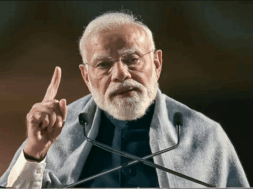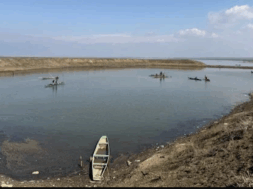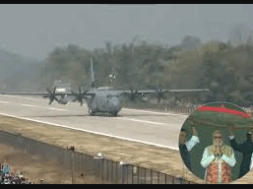
Iran – Israel Conflict: Air India Suspends Flights to Tel Aviv
Manas Dasgupta
NEW DELHI, Apr 14: Amidst escalating tension between Israel and Iran, Air India on Sunday decided to temporarily suspend flights to Tel Aviv.
An official said the direct flights between Delhi and Tel Aviv would be suspended for now. Air India operates four weekly flights between the national capital and Israeli city.
The Tata group-owned carrier recommenced services to Tel Aviv on March 3 after a gap of nearly five months, after suspending the flights to and from Tel Aviv from October 7, 2023, in the wake of the Hamas attack on the Israeli city.
Iran warned Israel and the United States on Sunday of a “much larger response” if there is any retaliation for its mass drone and missile attack on Israeli territory overnight, as Israel said “the campaign is not over yet.”
The Indian mission in Israel has issued a fresh “important advisory” for its nationals, advising them to stay calm and adhere to safety protocols. The MEA said India was closely monitoring the evolving situation. “We call for immediate de-escalation, exercise of restraint, stepping back from violence and return to the path of diplomacy,” it said in a statement.
Iran launched the attack over a suspected Israeli strike on its consulate in Syria on April 1 that killed top Revolutionary Guards commanders and followed months of clashes between Israel and Iran’s regional allies, triggered by the war in Gaza. Italy has called a video meeting of the G-7 leaders to discuss the Iranian attack, on Israel, sources in the prime minister’s office said. The UN Security Council will hold an emergency meeting on Iran’s attack on Israel at Israel’s request, a spokesperson for Malta, which holds the rotating presidency this month, told the media.
India has said it was concerned about the Iran-Israel escalation and has advised both nations to exercise restraint. The tension must be resolved through “dialogue & diplomacy”, the foreign ministry has said, balancing two crucial diplomatic ties.
Since late last evening, Iran — which backs Palestine — has launched a drone attack on Israel amid the latter’s war on Hamas. The Israeli military said most of the 200-plus ballistic missiles, cruise missiles and attack drones, were intercepted with the help of Israel’s allies before landing. Teheran said it was an act of “self-defence” after Iran’s diplomatic mission in Damascus was targeted.
Calling the situation a “humanitarian” tragedy, New Delhi said it was seriously concerned about the escalation of hostilities which threatened the peace and security in the region.
“We call for immediate de-escalation, exercise of restraint, stepping back from violence and return to the path of diplomacy. We are closely monitoring the evolving situation… It is vital that security and stability are maintained in the region,” the ministry has said in a statement.
India shares strong ties with Israel, with which it has cooperation in multiple fields — from defence to technology. The Prime Minister Narendra Modi has visited Israel in 2018 and his personal chemistry with PM Netanyahu is very good.
However, India’s positive relationship with Iran is far older. India and Iran concluded a defence pact in 2002. India was Iran’s second-largest importer of oil before the sanctions were imposed over its controversial nuclear programme. For four years, India has not been able to buy oil from Iran, but the two had remained close. Earlier this year, foreign minister S Jaishankar went for a visit to Iran, where India is invested in building the Chabahar port.
While India does not consider Hamas a terrorist organisation, the attack on Israel which triggered retaliation, was considered a terrorist attack. Mr Modi had described it as a “terrorist act” through a tweet. Through this, India has given a clear message that it was with Israel against terrorism.
At the same time, India has been raising its voice regarding the humanitarian tragedy in Gaza. New Delhi, which has been advocating a two-state solution, continues to help the Palestinians.
The Israeli army has said most of the missiles were intercepted before they crossed into Israel. US President Joe Biden has promised firm support for Israel against the Iranian attacks. “I just met with my national security team for an update on Iran’s attacks against Israel. Our commitment to Israel’s security against threats from Iran and its proxies is ironclad,” Biden said on X.
The US forces have been shooting down drones launched by Iran towards Israel, a defence official said. “Our forces remain postured to provide additional defensive support and to protect US forces operating in the region,” he said. President Biden also spoke to Israel Prime Minister Benjamin Netanyahu over the phone. Netanyahu has said Israel would respond to the attack strongly and that it has been preparing for a direct attack by Iran for years.
EU’s foreign policy chief Josep Borrell called for an extraordinary meeting of EU Foreign Affairs Ministers on Tuesday (April 16) to discuss Iran’s attacks against Israel. “Our objective is to contribute to de-escalation and security of the region” Borrell wrote on social media platform X.
Turkey said it did not want further escalation of tension in the region after Iran’s drone and missile attack against Israel, Turkish Foreign Minister Hakan Fidan told his Iranian counterpart in a phone call. Iranian Foreign Minister Hossein Amirabdollahian told Fidan that its “retaliatory operation” against Israel had ended, adding that Iran would not launch a new operation unless it was attacked, Turkish diplomatic sources said.












